A customer experience platform is essential for your team to gather valuable data, analyze insights, and take actions to enhance the connections between customers and your brand. Some advanced CX software even tracks customer sentiment and offers omnichannel customer experience.
The right CX platform can make significant difference regardless of which industry your team belongs to e-commerce, insurance, retail, or telecom. Gartner reports show that AI customer experience platforms achieved 25%+ improvements in satisfaction, revenue, or cost efficiency through automation and centralized data. Qualtrics users saw 7–12% annual increases in customer satisfaction and saved an average of $6.3 million in costs.
Here, we will share with you 12 top-reviewed customer experience providers that are tested by different industries, so you can pick the best one.
What Is a Customer Experience Platform
A customer experience platform includes a series of CX tools to help businesses manage customer interactions and improve customer satisfaction across multiple channels, such as websites, emails, apps, and social media.
From collecting customer data to analyzing their behavior patterns and purchase preference, a CX platform serves as an all-in-one toolkit for building a seamless and engaging customer experience.
Why is Customer Experience Platform So Important
A customer experience platform is important because it helps businesses unify customer data and offer real-time insights into customer behaviors, directly boosting customer loyalty, improving efficiency, and increasing revenue across all business operations. In a nutshell, adopting a CX management system can bring the 5 common benefits:
- Improve customer service agent efficiency.
- Reduce operational costs for human agents.
- Unify scattered customer data into a complete picture.
- Identify customer pain points for improvement.
- Offer fast and personalized support.
Different Types of Customer Experience Platform
Customer data experience platforms can be categorized by communication channels, AI adoption, and specific business goals. This part answers several frequently asked questions.
What is an AI Customer Experience Platform
An AI customer experience platform refers to CX management software powered by artificial intelligence technologies like machine learning, NLP, and predictive analytics. These AI platforms are capable of analyzing customer sentiment and predicting customer needs in real time, like a human being.
What is a Digital Customer Experience Platform
A digital customer experience platform is often used to optimize all digital customer interactions, including mobile apps, websites, social media, email, and online chat. All these digital touchpoints are unified by the platform to help businesses create seamless customer journeys.
What is Cloud Customer Experience Platform
A cloud customer experience platform is a suite of cloud-based tools that leverage cloud computing technology to manage customer interactions and streamline business operations. The platform usually integrates a CX management system with various channels, enabling businesses to centralize customer engagement across diverse touchpoints.
What is an Omnichannel Customer Experience Platform
An omnichannel customer experience platform is a unified system that integrates all communication channels of a business, including email, website, phone, app, and social media. This type of CX platform lets customers switch between channels seamlessly and maintain interaction consistently, without repeating their needs.
What is a B2B Customer Experience Platform
A B2B customer service platform is particularly designed for business-to-business scenarios, focusing on managing unique and long-term interactions between companies and their corporate clients. Unlike B2C platforms, it aims to perform complex tasks, like bulk order handling, cross-department collaborations, and dedicated account management.
12 Best Customer Experience Platform for 2025
Now, it’s high time to pick the ideal one for your business. This part highlights 12 top-tier CX platforms that are reviewed by Gartner or G2 for different industries.
12 Best Customer Experience Software Comparison Chart
Check out the quick comparison chart of the 12 top-reviewed CX software.
CX Software | Best for | Key Features | Starting price |
Solvea | Human-like customer service in e-commerce | l 1,000+ chats at once l Smart pre-sales and post-sales help l Strong security with U.S. laws l Self-learning knowledge base | |
LiveChat | Real-time support | l Reporting and analytics l Personalized customer messages l Security and encryption | $20/agent/month |
Intercom | Multilingual teams | l Omnichannel support l Workflow automation l Real-time and historical reports l Self-service | $39/agent/month |
Nextiva | Collaborative teams | l AI-powered customer journey l Personalized customer interactions l Advanced voice analytics l Real-time reporting tools | $25/user/month |
Freshdesk | Comprehensive ticketing system | l Ticketing system l Shared inbox l Customer portal l AI automation workflow | $15/agent/month |
HubSpot | Sales and marketing teams | l Customer feedback surveys l Self-service l Knowledge base publishing tools l Ticketing system | $15/agent/month |
Salesforce | Customer experience personalization | l Proactive service recommendations l Sales forecasting l Contact and lead management | $25/user/month |
Adobe Experience Manager | Digital asset and content management | l Content management system l Automatic workflows l Digital asset management | $30,000/year |
Tidio | Customer service chatbots | l Email marketing tool l Live chat software l Conversation routing | $25/user/month |
Liferay | Digital experiences for insurance | l Digital asset management l Tailored content management l A/B testing | $24,700/year |
Crownpeak | Global enterprises and retailers | l Content marketing tools l Tailored digital experience l Digital quality management | $5/user/month |
Contentful | Omnichannel content delivery and application development | l API-first approach l Content versioning l Customizable workflows | $15/user/month |
Best Customer Experience Platform for E-commerce
If you are seeking an AI customer experience platform for e-commerce businesses, pick one from the following products.
1. Solvea
Solvea is a comprehensive AI customer experience tool that offers instant and 24/7 support for customers in multiple languages. With human-like accuracy, it can understand what customers really need and improve their satisfaction, boosting sales and brand awareness. It has helped lots of companies, like Anker and VirgoCX, improve response rates up to 95% and increase satisfaction by 30%.
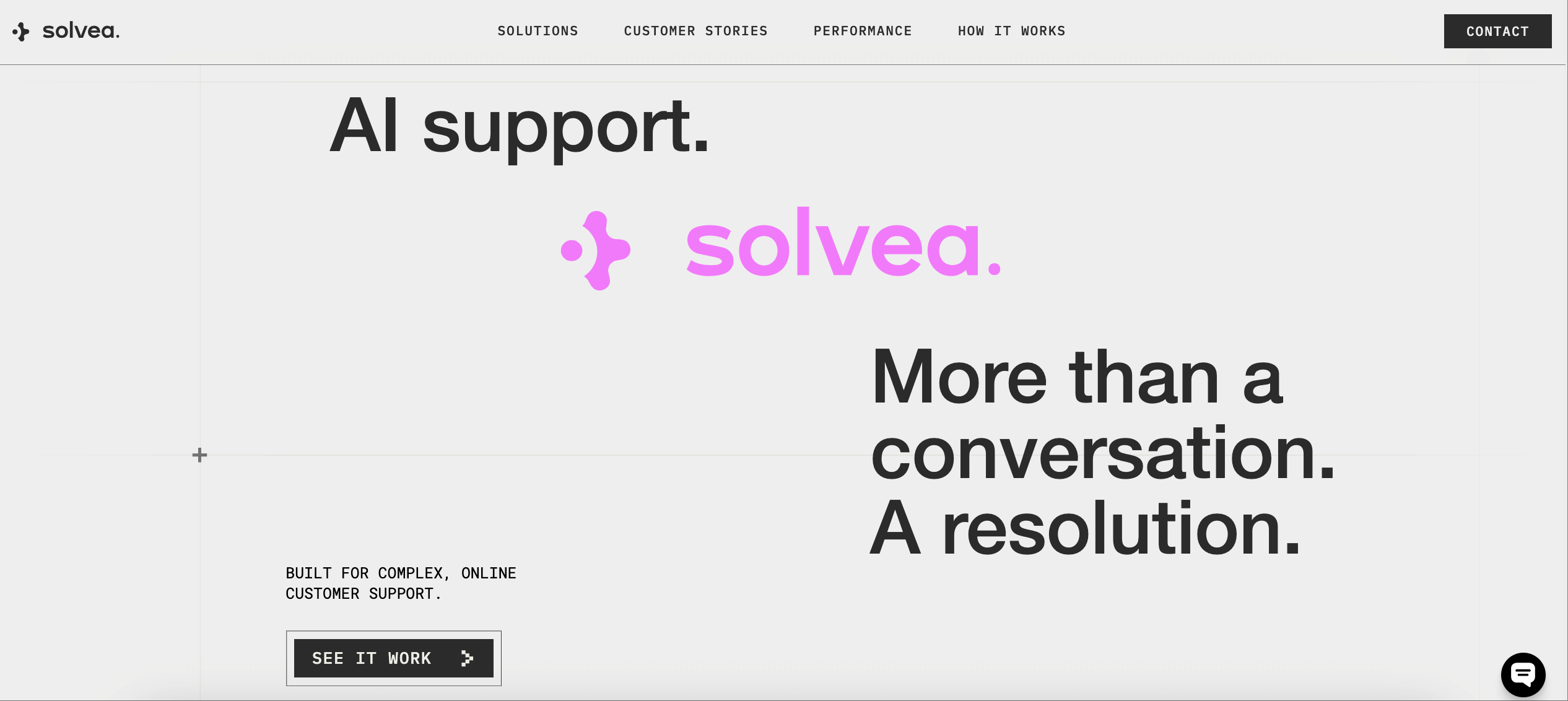
Pros:
- Outcome-based pricing (you will only pay for resolved conversations
- 24/7 multilingual support and cost savings
- Proven results: 80% accuracy, 30% resolution rate
- Successful case studies of clients: Anker, Z Gallerie, Aosom
Cons:
You need to book a demo to get customized pricing plans
2. LiveChat
LiveChat is an AI chatbot that offers real-time customer support via live chat, social media, and email communications. Its AI chatbot, Fin, can handle routine queries 24/7 and route complex issues to specialized agents. With strong integrations, it can pull customer data from platforms like Shopify, Salesforce, HubSpot, and WooCommerce.
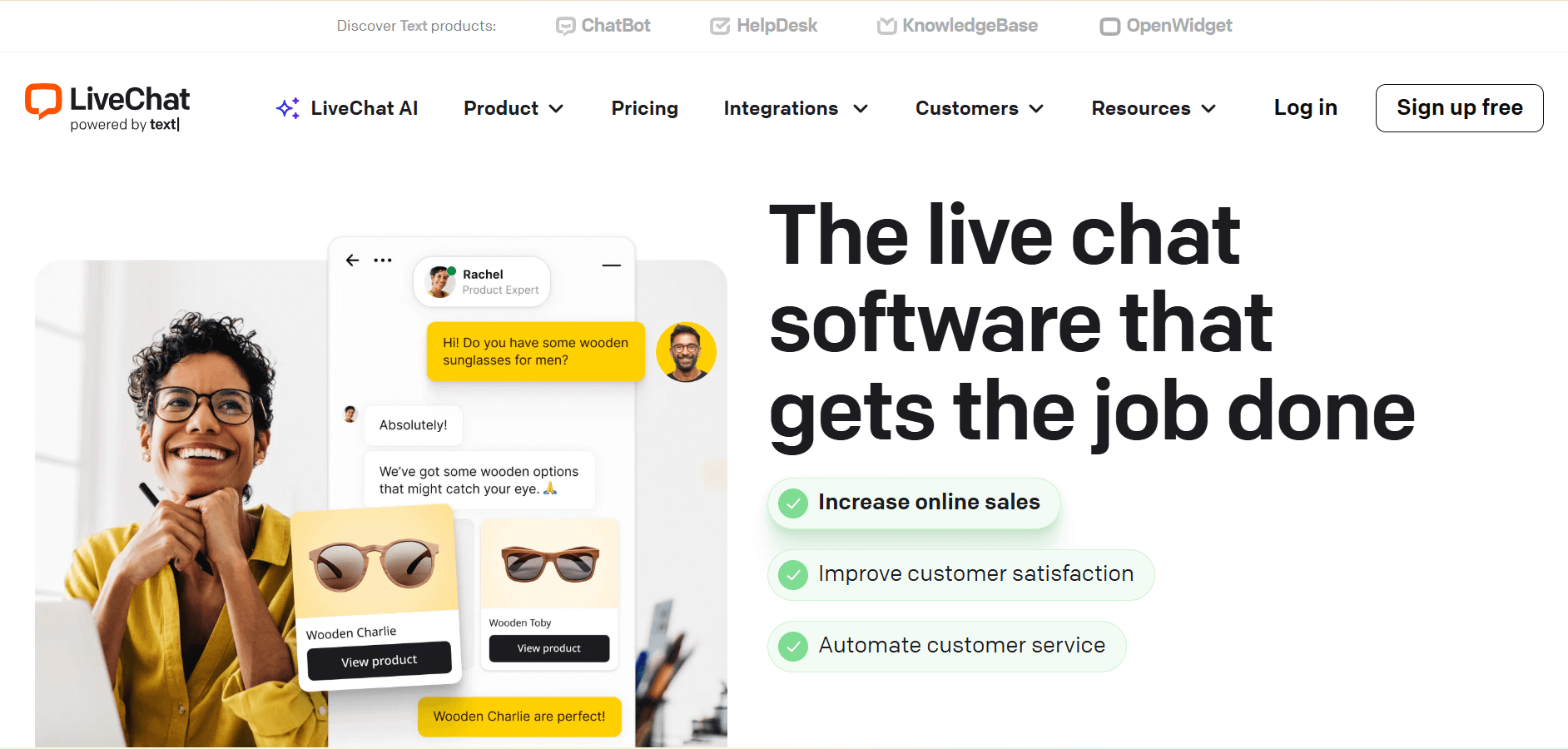
Pros:
- Omnichannel CX support
- Robust integration with e-commerce platforms
- Intelligent routing
Cons:
Lack of emotional context
3. Intercom
Intercom provides customers with a unified messaging experience by automatically adding AI chatbots to the workflow of live agents. It’s an all-in-one CX platform that integrates omnichannel support, customer data insights, and workload management tools, ideal for businesses aiming to boost agent efficiency and reduce operational costs.

Pros:
- User-friendly interface
- Help center
- Shared team inbox
Cons:
Complex pricing structure
Best Customer Experience Platform for Small Business
This part introduces several affordable and impactful customer service platforms for small businesses.
4. Nextiva
Nextiva is a CX management platform that offers affordable pricing plans for small businesses to enhance communications and customer interactions. With an AI-powered customer journey, it can track and analyze customer interactions across various touchpoints, helping businesses predict customer needs and deliver a consistent CX.

Pros:
- Supports team collaboration
- Comprehensive analytics and reporting tool
- Omnichannel support
Cons:
Overwhelming features are not easy to navigate
5. Freshdesk
Freshdesk is a CX-focused ticketing system software that integrates with a unified agent workspace, including workflow automation, ticket management, and AI-assisted responses. With self-service capabilities, it allow users to build and manage a customer-facing knowledge base.

Pros:
- Freshworks ecosystem
- Reporting and analytics
- Ease of use
Cons:
Advanced AI capabilities are not available in the Growth plan
6. HubSpot
HubSpot is a customer experience platform that’s best for sales and marketing teams. It combines a ticketing system, customer service analytics, and knowledge base publishing tools into a single platform, seamlessly integrating with sales and marketing workflows. Its native CRM system provides access to customer data for developing potential customers.

Pros:
- Sales and marketing ecosystem integration
- Automated ticket routing
- Native CRM system
Cons:
Limited features on lower plans
Best Customer Experience Platform for Telecom
Here are the top 2 customer experience platforms for the telecom industry.
7. Salesforce
Salesforce is a cloud-based customer experience management platform, ideal for the telecommunications industry. It offers many telecom-specific tools like omnichannel integration, AI analytics, and BSS/OSS connectivity to anticipate customer needs and customize interactions at scale.

Pros:
- Multiple pricing plans for various stages of business growth
- Scalable to customer needs
- Robust knowledge base
Cons:
Some features are not available in lower-tier plans
8. Adobe Experience Manager
Adobe Experience Manager is a powerful CX platform with a combination of content management systems and digital asset management, streamlining content creation and management processes. For telecom, it features tailored self-service to help companies scale globally.
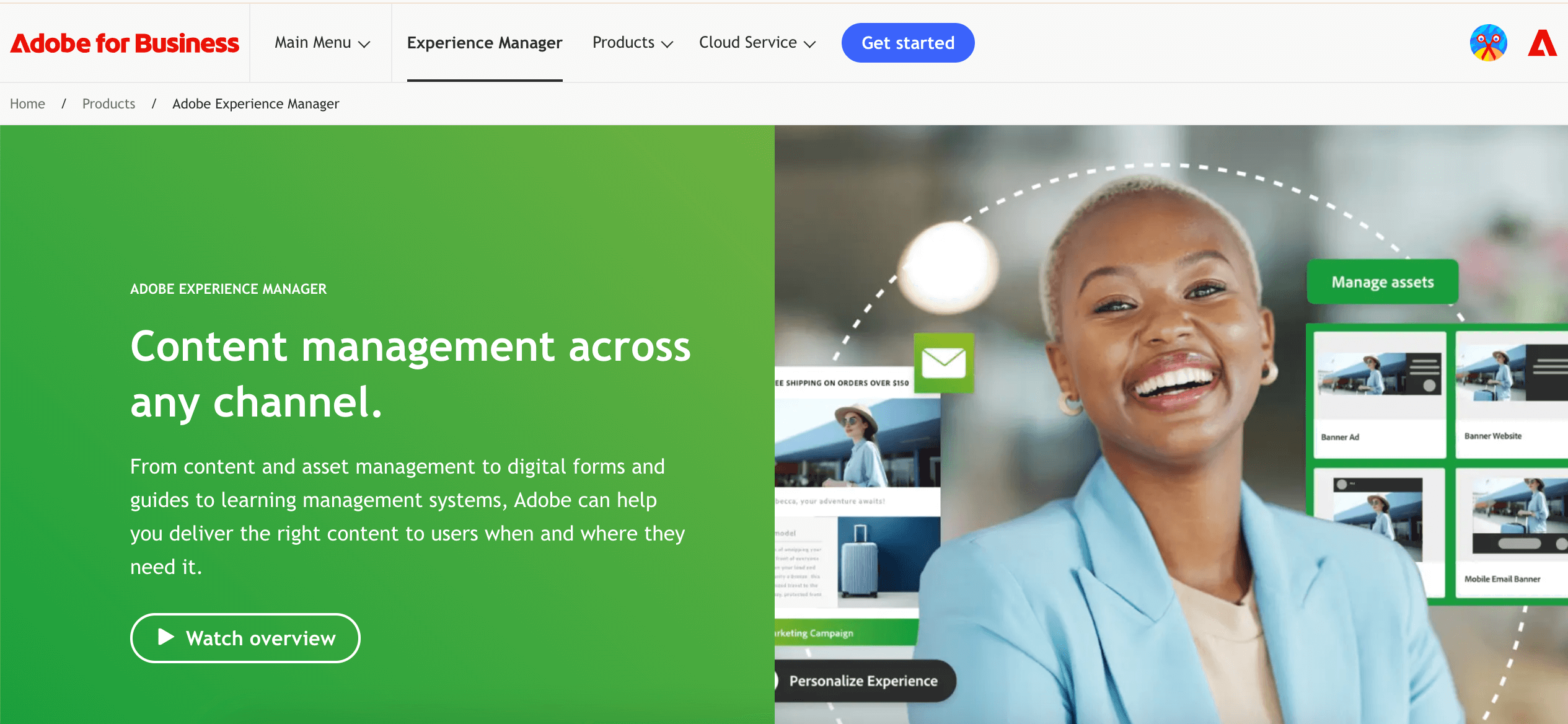
Pros:
- Enterprise-grade security
- Streamline content creation and management processes
- Collect customer data across key touchpoints
Cons:
Complex initial setup
Best Customer Experience Platform for Insurance
For the insurance industry, you can try the following two CX platforms.
9. Tidio
Tidio is a CX solution that offers an AI chatbot, live chat, and email marketing tools, best for insurers. It helps them simplify insurance policy inquiries and deliver guidance for claim processes, and sends timely policy renewal reminders, reducing client churn and improving service responsiveness.

Pros:
- Multilanguage capabilities
- A wide range of features inclis uded in the free plan
- 500 chatbot triggers included in the starter plan
Cons:
Limited live chat support
10. Liferay
Liferay is a digital customer experience platform delivered in a SaaS-based environment. It provides a set of capabilities to create websites, portals, and other digital experience solutions. Compliant content management helps insurance businesses deliver accurate and regulation-aligned policies across customer touchpoints.
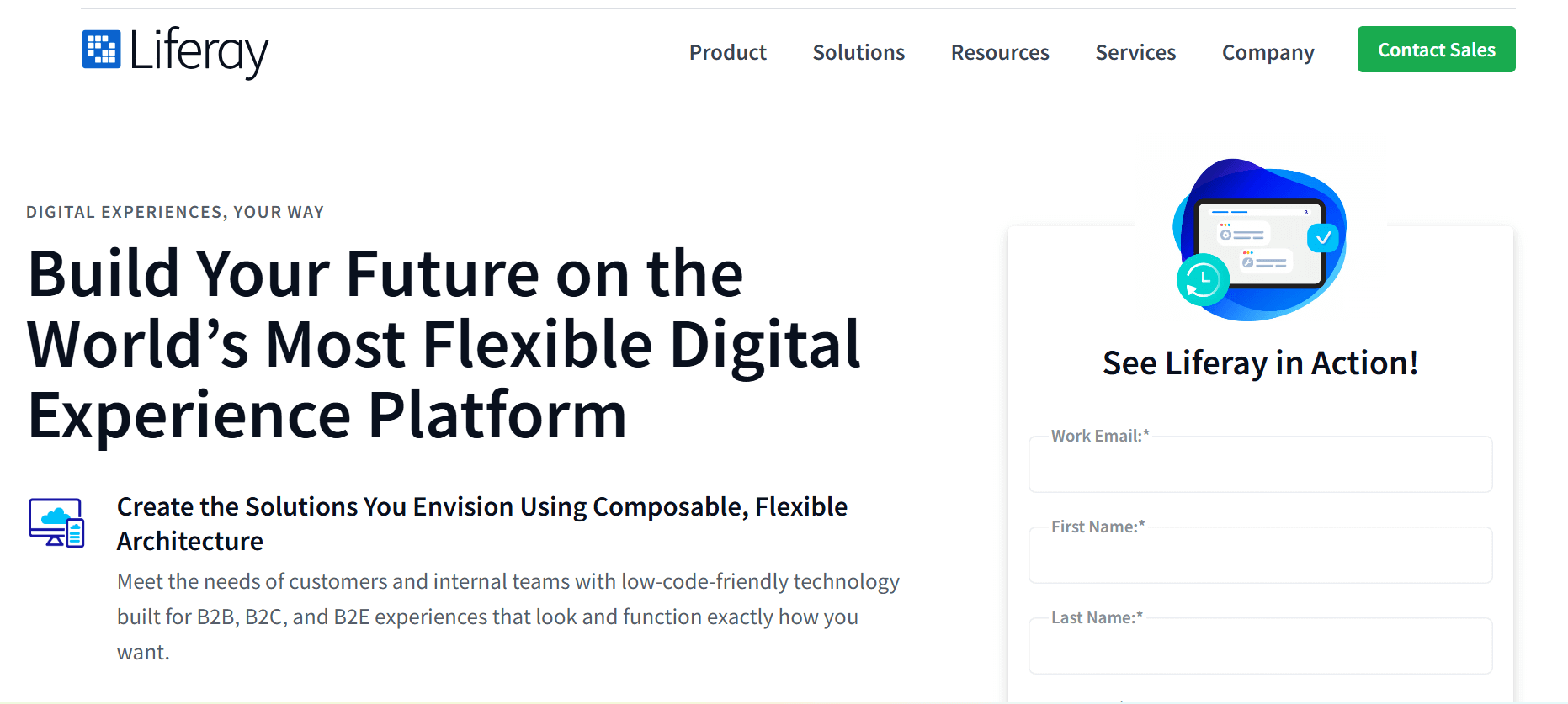
Pros:
- Supporting complex digital ecosystems
- Compliant content management
- Personalized customer interaction
Cons:
Extensive features lead to a steep learning curve
Best Customer Experience Platform for Retail
After investigating all reviews from Gartner, we list 2 the two best customer experience platforms for retail.
11. Crownpeak
Crownpeak is a SaaS-based customer experience software. It’s particularly ideal for retail businesses specializing in enterprise content management. With excellent content delivery capabilities, it enables in-store digital displays and social commerce channels. It helps retailers provide consistent product content and promotions while scaling customer experiences.
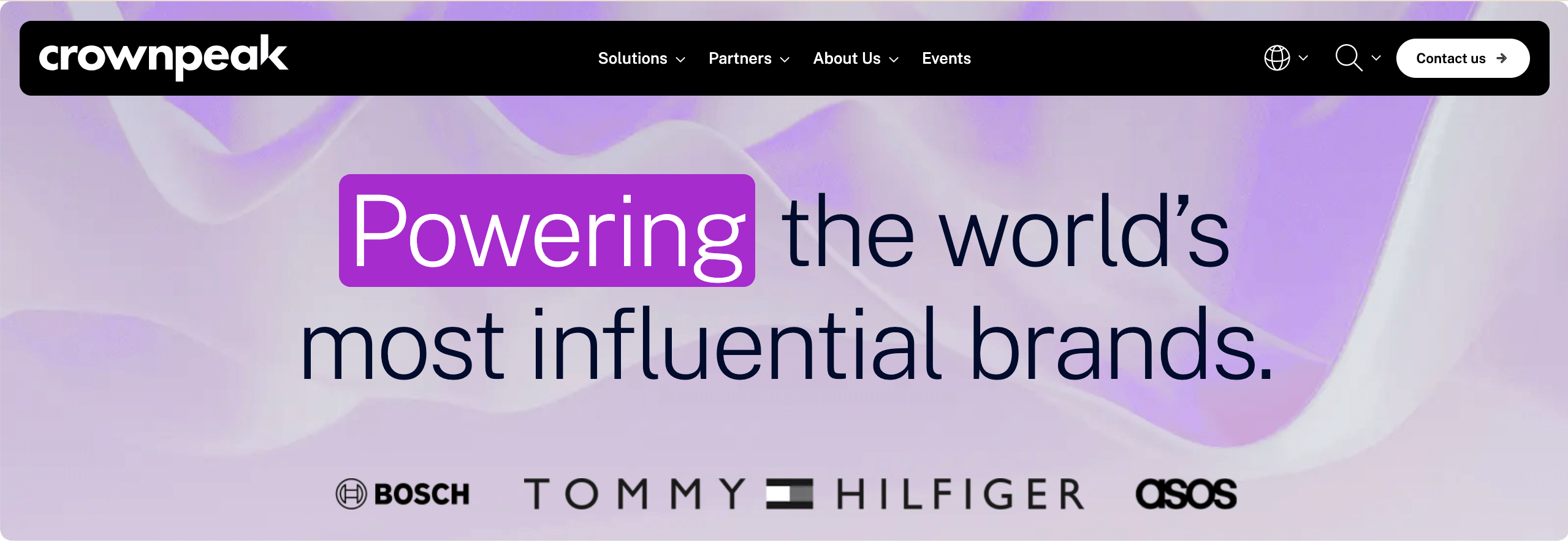
Pros:
- Omnichannel content supports
- Retail-specific compliance
- Robust digital accessibility
Cons:
Higher cost for small-to-mid retail businesses
12. Contentful
Contentful is a CX platform focused on personalized and agile content management for retailers. It helps them adapt to market trends quickly by integrating dynamic content management across e-commerce platforms, mobile apps, and in-store kiosks. It can seamlessly sync customer data with retail tools, like Shopify, Adobe Commerce, and an inventory system.
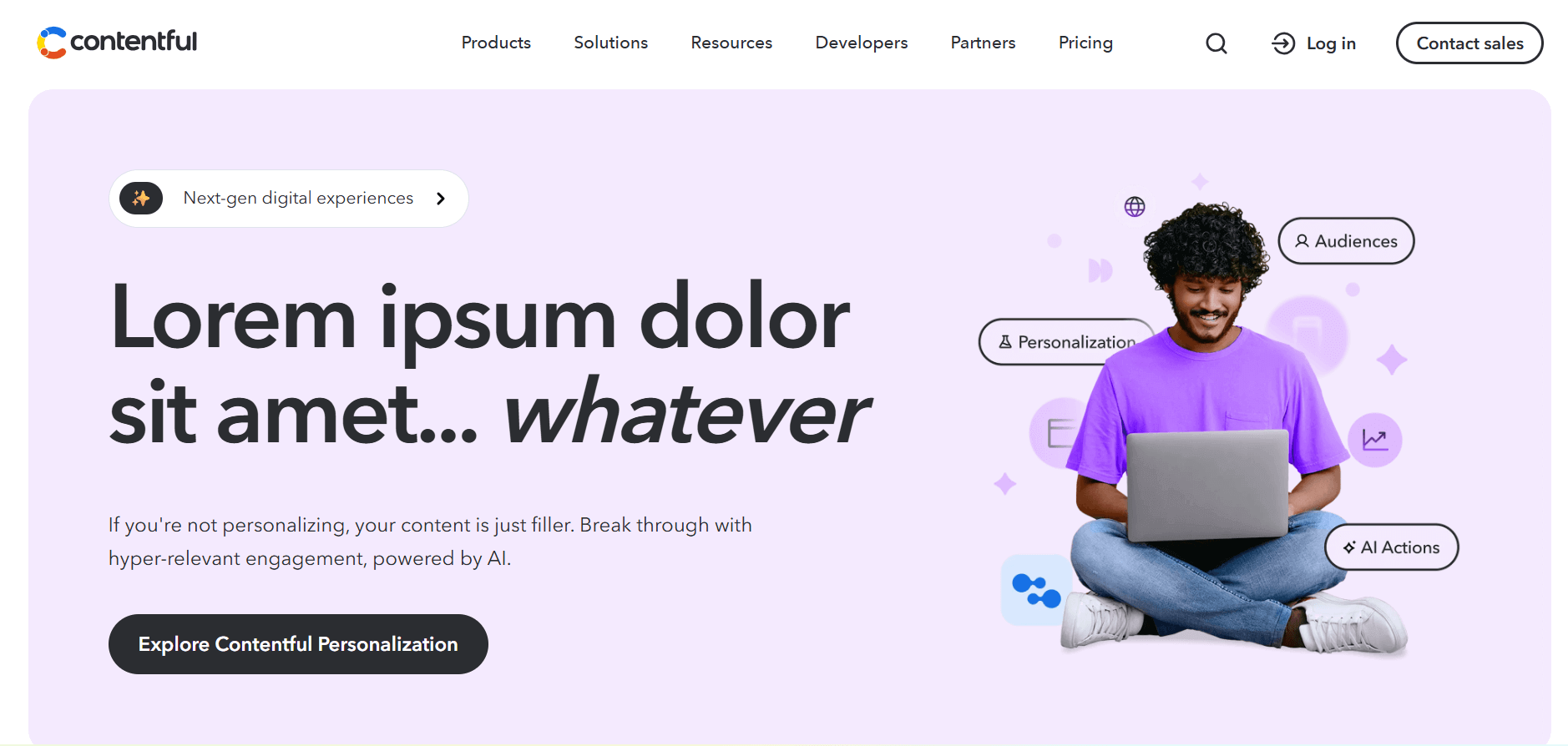
Pros:
Diverse retail digital touchpoints
Seamless retail tool integration
No-code content updates
Cons:
A complex technical setup
How to Choose the Right Customer Experience Software
Choosing the right customer experience software for your business is key to streamlining workflows and improving customer satisfaction. Consider these factors:
Compliance and security: To safeguard customer data, choose platforms with encryption, single sign-on, and data protection features
Ensure scalability: Choose software that can scale with growing customers, teams, and organizational needs.
Ease of use: For startups, select the platform with quick setup and minimal training requirements.
Evaluate total costs: Look for verified customer stories to avoid potentially high maintenance costs.
Customer Experience Platform FAQs
1. What is the difference between CRM and customer experience platforms?
CRM (Customer Relationship Management) focuses on managing customer data and sales, and relationship workflows, while a customer experience (CX) platform usually integrates omnichannel interactions to optimize customer journey and address their pain points.
2. What are CSM platforms?
CSM (Customer Success Management) platforms provide solutions, particularly for subscription-based businesses. These platforms focus on driving long-term customer values after they purchase a product or service, such as monitoring customer health metrics, identifying churn risks early, and offering personalized onboarding
3 .What is SaaS CX platform?
SaaS (Software as a Service) CX platform is tailored for businesses focusing on all customer interactions throughout the entire SaaS buyer journey. It involves how, when, and where to find and contact the SaaS providers, convert them into customers, and maintain ongoing interaction with your company after subscription.
4. What is CX vs. UX?
Customer Experience (CX) encompasses all interactions a customer has with your company through the buying process, while User Experience (UX) refers to all interaction a user has with a specific system, such as a website, mobile app, etc. In other words, UX is one part of the larger CX.












